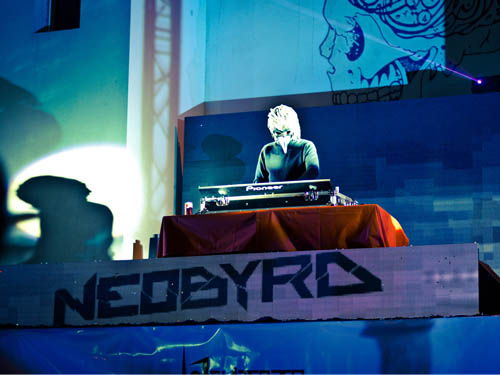Apparently, you can’t judge a book by its cover. Whether this extends to album covers as well is debatable, but a quick glimpse at the artwork for Wust el-Balad’s new album Robabekya (2011) tells you pretty much all you need to know about the music that comes with it.
The laziness, the complete absence of genuine effort or creativity, the forced and entirely unconvincing “laid back” vibe – these problems don’t stop at the cover. They soak through each and every one of the album’s 10 songs.
It took me three attempts to get through the first track. The first time, I got as far as twelve seconds – just as the twinkly keyboard set in over the oud melody and muted drum beat – before deciding I wasn’t in the right mood to listen to the remaining 45 minutes of what I assumed would be similarly glossy music. Realizing I would probably never be in the “right mood,” I gave it another shot a half hour later, but, again, could not get much further.
“Robabekya,” a term referring to used items given away to or exchanged by street vendors, and the titular track from Wust el-Balad’s new album, expands on the problems only hinted at by the underwhelming artwork, effectively summing up all the faults awaiting the listener.
It struggles to hold itself together, has naive lyrics emphasized by distractingly loud vocals and is filled with unnecessary sound effects, such as the repetitive background chants of “Robabekya!” and, inexplicably, “cha-cha-cha,” even though it’s not that type of song. And, for being the listener’s introduction to the album, it commits a pretty unforgivable crime early on by including a terrible mid-section rap, which is when I was forced to turn off my iPod for the second time.
After about 15 seconds of chanting, the second song, “Kol Youm” (Every Day) starts with the plucking of an acoustic guitar and the aimless strumming of an electric one, with a lead singer observing, “Every day I wake up in the morning, and when night comes, I sleep,” which is at least relatable, if entirely redundant songwriting, especially given how often it’s repeated over the course of the song’s six unjustifiable minutes. The chorus isn’t much better: “I wish I was someone else, I wish my destiny would be changed for me/I wish for more freedom, and to fly like a pigeon/oh my.”
With its cymbal-caressing sentimentality and nocturnal guitars, “Kol Youm” is the kind of sap Dave Matthews would have recorded 20 years ago and briefly considered releasing as a B-side, before deciding to scrap it instead – and rightly so.
Sadly, the Dave Matthews comparison is apt, considering that’s what the members of Wust el-Balad seem most intent on molding their band into, at least based on this evidence. There are “Egyptian” sounds in there, but they’re mostly superfluous and stereotypical flourishes that seem tacked onto the otherwise 1990s soft rock melodies.
Soft rock, though, isn’t all Robabekya has to offer. The band members take equally unsuccessful stabs at Paul Simon-esque Afro-pop, reggae, and, strangely enough, Russian folk music in “El Garia wel Sultan” (The Servant Girl and the Sultan), which rips off “Kalinka Malinka” to come up with a far more annoying result. There’s even a doo-wop effort, found in the over-sentimentality of “Aaneqeeni” (Embrace Me).
Some constants survive the schizophrenia – almost every song, regardless of its style, has the obligatory and fairly unsophisticated guitar solo, and the lead singer repeating his lines with more passion (i.e. louder) than the first several times they were sung.
The song structures are numbingly unimaginative, and the jarring variety of genres seemingly limited to whatever you’d find on a “Best of the '90s” compilation CD. It’s not nostalgic; it’s just really outdated. However, that should not be taken as an excuse; Robabekya would be a poor effort in any time period.
Despite the way it seems at times, Robabekya does eventually end, closing with “Le Habeebon” (For a Lover), a ballad you’d swear you’ve already heard at least twice on the album. In fact, the decision to have the chorus sung in English seems to have been made solely to help differentiate the song from the previous nine tracks. Unfortunately, all it does is demonstrate that the band’s songwriting deficiencies are bilingual: “Looking for the light so shiny, so bright/Looking for the truth so clear, so smooth.”
Listeners who have followed them long enough claim that Wust el-Balad were once an innovative, enthusiastic band, famed for fusing their live performances with a creative energy unrivalled at the time. If so, then what happened? Has signing to a major label sucked all the life out of them? Are they older and no longer capable of their youthful energy? Or are they just as lazy as they sound?
Ultimately, Robabekya is so annoyingly calculated, so overproduced and polished, and yet it fails on every level, making it the type of album that just gets you angry. Bad songwriting, bad artwork, bad decisions all around, Robabekya is exactly where this album belongs, and that, unfortunately, is the “smooth” truth.




